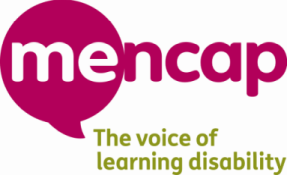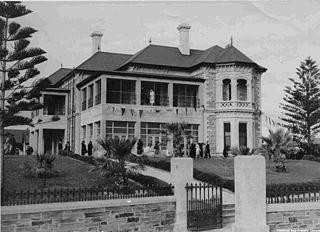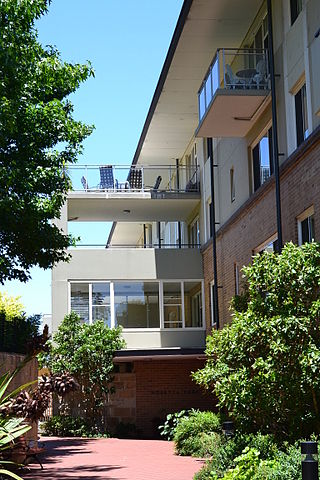Related Research Articles
Mission Australia is a national Christian charity that provides a range of community services throughout Australia. It has its roots in the Brisbane sector of The British and Foreign Bible Society’s sub-committee, The Colporteur Society (1869), and Sydney City Mission (1862), but was only officially established in 1996, bringing together a number of city missions across the country. The organisation specialises in the areas of homelessness and housing, families and children, early learning, youth, employment and skills, substance abuse, disability, mental health, and strengthening communities. Sharon Callister has been CEO since March 2022.

The Royal Mencap Society is a charity based in the United Kingdom that works with people with learning disabilities. Its Charity Number is 222377.
Respite care is planned or emergency temporary care provided to caregivers of a child or adult.

The Benevolent Society, founded by Edward Smith Hall in 1813, is Australia's first and oldest charity. The society is an independent, not-for-profit organization whose main goals include helping families, older Australians and people with disabilities.
Ageing, Disability and Home Care NSW (ADHC) was a division of the Department of Family and Community Services in the Government of New South Wales that is responsible for the provision of services to older people, people with a disability, and their families and carers in the state of New South Wales, Australia.
Spinal Cord Injuries Australia (SCIA) is a non-government organisation which provides advocacy and services to people with spinal cord injury and similar conditions.

Leonard Cheshire is a major health and welfare charity working in the United Kingdom and running development projects around the world. It was founded in 1948 by Royal Air Force officer Group Captain Leonard Cheshire VC.

TAD Australia is an Australian federation of state not-for-profit organisations which provide personalized equipment, technology, and services to disabled persons, including children.
Cerebral Palsy Alliance is an Australian nonprofit organisation helping babies, children, teenagers and adults living with cerebral palsy and other neurological and physical disabilities. Its therapy teams work with individuals and families to maximise their participation in the community.

Vocational rehabilitation, also abbreviated VR or voc rehab, is a process which enables persons with functional, psychological, developmental, cognitive, and emotional disabilities, impairments or health disabilities to overcome barriers to accessing, maintaining, or returning to employment or other useful occupations.
One Door Mental Health, formerly Schizophrenia Fellowship of New South Wales Inc (SFNSW), is a community-based not for profit organisation that provides a range of services for people with mental illness, their families, and carers. One Door Mental Health operates predominantly in the Australian state of New South Wales.

The National Disability Insurance Scheme (NDIS) is a scheme of the Australian Government that funds costs associated with disability. The scheme was legislated in 2013 and went into full operation in 2020. Its introduction followed the 15 month long 'Make It Real' campaign which involved community forums, visits to MPs, the holding of a National Disability and Carer Congress, 'Disabilitea' gatherings, and rallies involving 20,000 people. The scheme is administered by the National Disability Insurance Agency (NDIA) and overseen by the NDIS Quality and Safeguards Commission. Bill Shorten provides ministerial oversight as Minister for the National Disability Insurance Scheme.
Four million people in Australia (18.5%) reported having a disability in 2009, according to the results of the Survey of Disability, Ageing and Carers. Males and females were similarly affected by disability.

Youngcare is an Australian non-for-profit organisation founded in 2005 to assist people between the ages of 16 and 65 with high physical support needs. Youngcare's programs and projects focus on supporting young people with a physical disability by providing greater choice in housing and care options. Currently, there are over 3,340 young people with high physical support needs living in residential aged care facilities. Common types of disability of those supported by Youngcare include cerebral palsy, multiple sclerosis or an acquired brain injury.
Disability in the United Kingdom covers a wide range of conditions and experiences, deeply impacting the lives of millions of people. Defined by the Equality Act 2010 as a physical or mental impairment with a substantial and long-term adverse effect on a person's ability to carry out normal day-to-day activities, it encompasses various aspects of life, including demographics, legislation, healthcare, employment, and culture. Despite numerous advancements in policy and social attitudes, individuals with disabilities often encounter unique challenges and disparities.

Novita is a South Australian disability organisation, providing support, services and equipment to children, teens and young adults living with disability, their families and carers. In August 2019, it was announced that scosa was to merge into Novita.
scosa was a South Australian organisation providing a range of supports to children and adults with disabilities. Initially it focused on people with cerebral palsy. In August 2019, it was announced that scosa was to merge into Novita.

Aged care in Australia, is the provision of services to meet the unique needs of older people in Australia. It includes both residential aged care as well as services provided in the home such as personal care, domestic assistance, home nursing, nutrition and meal preparation, respite services, continence management, mobility & dexterity assistance, transport, social support and the provision of equipment and aids.
Sydney Community Services (SCS) is a not-for-profit community services organisation based in the Lane Cove and Hunters Hill local government areas in Sydney, New South Wales.

Dementia and Alzheimer's disease in Australia is a major health issue. Alzheimer's disease is the most common type of dementia in Australia. Dementia is an ever-increasing challenge as the population ages and life expectancy increases. As a consequence, there is an expected increase in the number of people with dementia, posing countless challenges to carers and the health and aged care systems. In 2018, an estimated 376,000 people had dementia; this number is expected to increase to 550,000 by 2030 and triple to 900,000 by 2050. The dementia death rate is increasing, resulting in the shift from fourth to second leading cause of death from 2006 to 2015. It is expected to become the leading cause of death over the next number of years. In 2011, it was the fourth leading cause of disease burden and third leading cause of disability burden. This is expected to remain the same until at least 2020.
References
- ↑ "Redland Respite Care merges with national disability organisation Afford". Redland City Bulletin. 17 June 2019.
- ↑ "AFFORD Charity Information - PrizeHomeTickets".
- ↑ Thomas, Stacy (16 June 2016). "NDIS introduces seismic changes in biggest reform since Medicare". Daily Telegraph.
- ↑ https://buyability.org.au/organisation/99/ Afford BuyAbility
- ↑ "NDIS provider accused of compromising safety of people with disability in quest for growth". ABC News. 10 June 2021.
- ↑ "About". 14 September 2020.
- ↑ "Finding a Job".